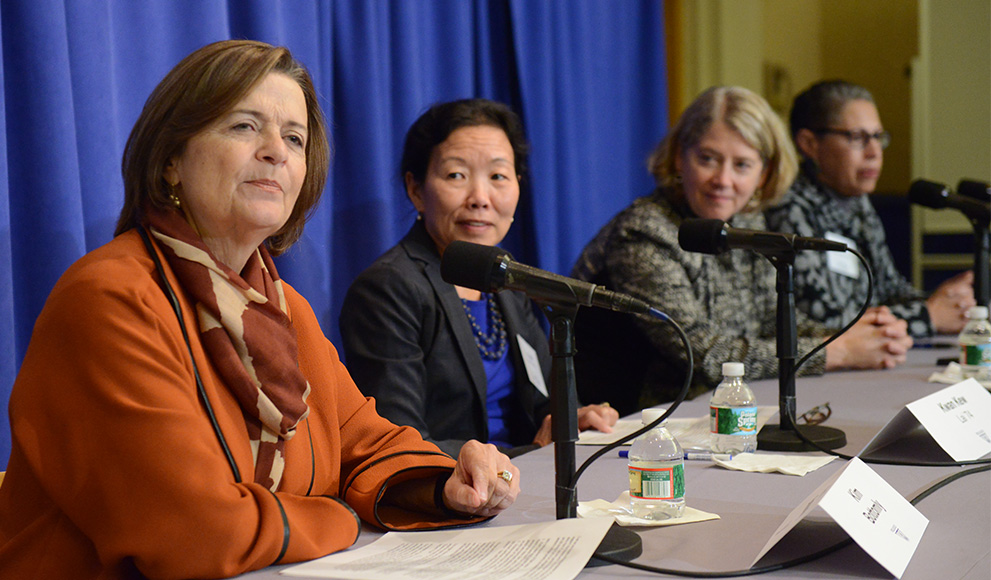Women In STEM: One of Nine Panel Discussions Exploring The Wellesley Effect

In November, we shared the first of a series of videos of the inspiring remarks given by Wellesley alumnae during the launch of Wellesley's Campaign to celebrate, strengthen, and advance the Wellesley Effect. Another key component of the Campaign launch celebration was panel discussions that brought students and alumnae together on topics ranging from Student Stories to Art and Architecture at Wellesley to Innovation in The Liberal Arts. Nine panel discussions are included among the videos now available on the College's YouTube channel. Today we feature one of them: Women in STEM.
“If you’re going to major in a STEM field, then you’re far better off as an undergraduate doing it at a liberal arts college…and, in particular, if you’re a woman, [attending] a women’s college greatly increases the probability that you’re going to have a successful career in STEM,” said President H. Kim Bottomly, who moderated the panel, in her opening remarks.
Bottomly, herself a renowned immunobiologist, led the discussion which featured Kwan Kew Lai ’74, infectious disease specialist, Pamela Melroy ’83, former NASA astronaut, and Susan Windham-Bannister ’72, president and CEO at Biomedical Growth Strategies. The panelists shared stories about what it’s like to be a woman in science and talked about the Wellesley Effect and how their Wellesley education served them in their careers.
“Many, many years ago, Wellesley reached half way across the world to offer me a scholarship to join the class of 1974,” said Lai. Wellesley, she said, opened up the door to her medical career.
Lai, who Bottomly described as a “doctor who knows no borders,” has spent much of her career travelling the world taking care of refugees and those impacted by man made and natural disasters. Most recently she worked in Liberia and Sierra Leone taking care of patients in Ebola treatment centers and in Nepal after the earthquake.
“I’ve taken the Wellesley College motto, Non Ministrari sed Ministrare, to heart,” Lai said. “My experiences have taught me, while I cannot change the world, I can surely change the world for a few people.”
Melroy, the second woman to command a space shuttle, said she came to Wellesley knowing exactly what she wanted to do. From an early age, she wanted to study science then go on to be an Air Force test pilot—and that’s exactly what she did.
Melroy shared that she earned good grades through high school by memorizing information. However, through her time at Wellesley and her experience with the liberal arts curriculum, she said she learned that this isn’t the way to approach science. She credited several professors, including Dick French, Louise Sherwood McDowell and Sarah Frances Whiting Professor of Astrophysics and professor of astronomy, and Wendy Hagen Bauer, professor emerita of astronomy, with changing her understanding.
“Memorizing is not the solution in science, you have to use reason. Once you begin to reason your way through those things, all of those equations that seemed so hard for me to put together started to fall into place,” Melroy said. “For me, that was what Wellesley taught me…it unlocked the world because suddenly nothing was ever going to be too hard for me again.”
She also shared another way in which Wellesley changed her outlook. “When every physics major you know is a woman, when every chemistry major you know is a woman, when every pre med major you know is a woman, and half of the faculty are women, and you graduate and someone tries to tell you that women are not good at science and math, you’re like, what? It could not penetrate the thing that I knew to be true by going to Wellesley,” she said.
Windham-Bannister, who in 2013 was named among the 10 most influential women in biotech by the Boston Globe, is credited with turning Massachusetts into an undisputed leader in the biosciences—but she’s not a scientist by training.
Windham-Bannister shared that she came to Wellesley intending to major in English and become a journalist. Her sophomore year, an anthropology class piqued her interest and, driven by a desire to understand group behavior, she pursued a degree in sociology.
After Wellesley she went to work in a community health center then on to a doctoral program, then a career in healthcare and health policy. She developed an interest in innovation and, later, was tapped to lead Massachusetts Life Sciences Center, a billion dollar investment in life sciences research and manufacturing.
“A liberal arts education meant that I had a very broad perspective on things,” she said and compared having studied a variety of different subject areas to being multilingual. “It means that I can frame a problem and I can frame a solution in ways that people from many different disciplines can relate to—I can find the common ground,” she said.
She added that she learned courage from her time at Wellesley. “You are encouraged here to dream and you are taught to believe that you an accomplish those dreams. You can figure things out, you learn to think and if you know how to think, you can do anything. You can put yourself into new situations and figure out how to be successful.”
What does the Wellesley Effect mean to you? Share your voice on the Campaign website.
